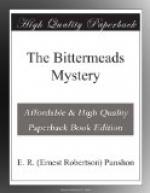Or perhaps no attempt would be made to hide his death since, after all, it is always permissible to shoot an armed burglar.
The clock on the stairs began to strike the hour, and he wondered if he would still be alive when the last stroke sounded.
He did not much think so for he thought he could read a very deadly purpose in the other’s cold grey eyes, nor did he suppose that a man with such a secret as that of the attic upstairs to hide was likely to stand on any scruple.
And he thought that if he still lived when the clock finished striking he would take it for an omen of good hope.
The last stroke sounded and died away into the silence of the night.
The revolver was still levelled at his heart, the grim purpose in the other’s eyes had not changed, and yet Dunn drew a breath of deep relief as though the worst of the danger was past.
Through his mind, that had been a little dulled by the sudden consciousness of so extreme a peril, thought began again to race with more than normal rapidity and clearness.
It occurred to him, with a sense of the irony of the position, that when he entered this house it had been with the deliberate intention of getting himself discovered by the inmates, believing that to show himself to them in the character of a burglar might gain him their confidence.
It had seemed to him that so he might come to be accepted as one of them and perhaps learn in time the secret of their plans.
The danger that they might adopt the other course of handing him over to the police had not seemed to him very great, for he had his reasons for believing that there would be no great desire to draw the attention of the authorities to Bittermeads for any reason whatever.
But the discovery he had made in the attic changed all that. It changed his plans, for now he could go to the police immediately. And it changed also his conception of how these people were likely to act.
Before, it had not entered his mind to suppose that he ran any special risk of being shot at sight, but now he understood that the only thing standing between him and instant death was the faint doubt in his captor’s mind as to how much he knew.
It seemed to him his only hope was to carry out his original plan and try to pass himself off as the sort of person who might be likely to be useful to the master of Bittermeads.
“Don’t shoot, sir,” he said, in a kind of high whine. “I ain’t done no harm, and it’s a fair cop—and me not a month out of Dartmoor Gaol. I shall get a hot ’un for this, I know.”
The little fat man did not answer; his eyes were as deadly, the muzzle of his pistol as steady as before.
Dunn wondered if it were from that pistol had issued the bullet that had drilled so neat and round a hole in his friend’s forehead. He supposed so.
He said again
“Don’t shoot, Mr. Deede Dawson, sir; I ain’t done no harm.”




